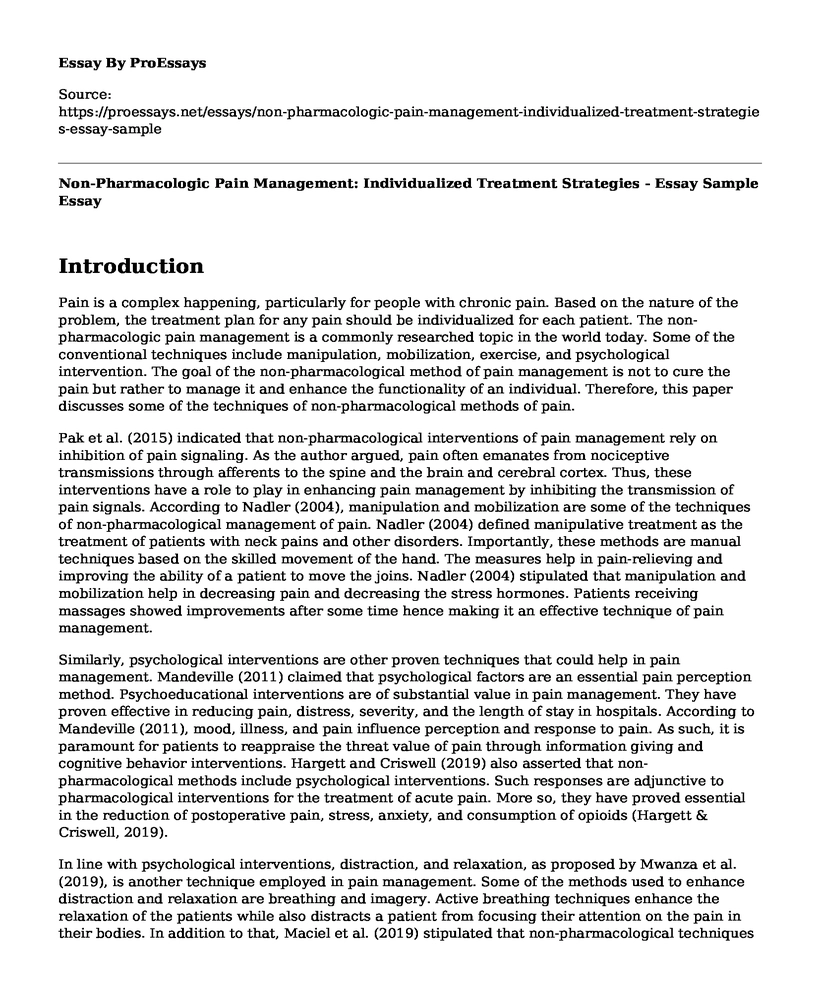Introduction
Pain is a complex happening, particularly for people with chronic pain. Based on the nature of the problem, the treatment plan for any pain should be individualized for each patient. The non-pharmacologic pain management is a commonly researched topic in the world today. Some of the conventional techniques include manipulation, mobilization, exercise, and psychological intervention. The goal of the non-pharmacological method of pain management is not to cure the pain but rather to manage it and enhance the functionality of an individual. Therefore, this paper discusses some of the techniques of non-pharmacological methods of pain.
Pak et al. (2015) indicated that non-pharmacological interventions of pain management rely on inhibition of pain signaling. As the author argued, pain often emanates from nociceptive transmissions through afferents to the spine and the brain and cerebral cortex. Thus, these interventions have a role to play in enhancing pain management by inhibiting the transmission of pain signals. According to Nadler (2004), manipulation and mobilization are some of the techniques of non-pharmacological management of pain. Nadler (2004) defined manipulative treatment as the treatment of patients with neck pains and other disorders. Importantly, these methods are manual techniques based on the skilled movement of the hand. The measures help in pain-relieving and improving the ability of a patient to move the joins. Nadler (2004) stipulated that manipulation and mobilization help in decreasing pain and decreasing the stress hormones. Patients receiving massages showed improvements after some time hence making it an effective technique of pain management.
Similarly, psychological interventions are other proven techniques that could help in pain management. Mandeville (2011) claimed that psychological factors are an essential pain perception method. Psychoeducational interventions are of substantial value in pain management. They have proven effective in reducing pain, distress, severity, and the length of stay in hospitals. According to Mandeville (2011), mood, illness, and pain influence perception and response to pain. As such, it is paramount for patients to reappraise the threat value of pain through information giving and cognitive behavior interventions. Hargett and Criswell (2019) also asserted that non-pharmacological methods include psychological interventions. Such responses are adjunctive to pharmacological interventions for the treatment of acute pain. More so, they have proved essential in the reduction of postoperative pain, stress, anxiety, and consumption of opioids (Hargett & Criswell, 2019).
In line with psychological interventions, distraction, and relaxation, as proposed by Mwanza et al. (2019), is another technique employed in pain management. Some of the methods used to enhance distraction and relaxation are breathing and imagery. Active breathing techniques enhance the relaxation of the patients while also distracts a patient from focusing their attention on the pain in their bodies. In addition to that, Maciel et al. (2019) stipulated that non-pharmacological techniques favor care modalities, especially when pain among patients is extreme. Given that pain management remains a challenge for most people, it would be best to integrate the non-pharmacological measures described above in line with the pharmacological interventions prescribed by doctors.
Conclusion
In conclusion, pain is one of the conditions facing most people that have specific illnesses and diseases. In a bid to manage pain, researchers and medical personnel are proposing medical and non-medical interventions. Some of the non-medical measures discussed in this paper include manipulation and mobilizing, which is also referred to as massage, and psychological interventions such as distraction and relaxation, among others. From this analysis, I have learned that non-pharmacological interventions for pain management are effective in pain management. Secondly, I have learned that psychological interventions, which entail simple exercises such as breathing, can alleviate pain. Lastly, I found it interesting that a simple distraction could help in pain alleviation as well. The literature review has helped in fostering my understanding of the topic further since I have familiarized myself with the various non-medical interventions for pain management. Nursing research is essential since it helps in improving the quality of care given to patients.
References
Hargett, J. L., & Criswell, A. C. (2019). Non-pharmacological interventions for acute pain management in patients with opioid abuse or opioid tolerance. JBI Database of Systematic Reviews and Implementation Reports, 17(7), 1283-1289. doi: 10.11124/jbisrir-2017-003878
Maciel, H. I. A., Costa, M. F., Costa, A. C. L., Marcatto, J. de O., Manzo, B. F., & Bueno, M. (2019). Pharmacological and nonpharmacological measures of pain management and treatment among neonates. Revista Brasileira de Terapia Intensiva, 31(1). doi: 10.5935/0103-507x.20190007
Mandeville, A. L. (2011). Non-pharmacological methods of acute pain management. In Oxford Medicine Online. doi: 10.1093/med/9780199234721.003.0003
Mwanza, E., Gwisai, R. D., & Munemo, C. (2019). Knowledge on nonpharmacological methods of pain management among nurses at Bindura Hospital, Zimbabwe. Pain Research and Treatment, 2019, 1-8. doi: 10.1155/2019/2703579
Nadler, S. F. (2004). Nonpharmacologic management of pain. The Journal of the American Osteopathic Association, 104(11), 6S-12S. https://jaoa.org/article.aspx?articleid=2092892
Pak, S. C., Micalos, P. S., Maria, S. J., & Lord, B. (2015). Nonpharmacological interventions for pain management in paramedicine and the emergency setting: A review of the literature. Evidence-Based Complementary and Alternative Medicine, 1-8. doi:10.1155/2015/873039
Cite this page
Non-Pharmacologic Pain Management: Individualized Treatment Strategies - Essay Sample. (2023, May 05). Retrieved from https://proessays.net/essays/non-pharmacologic-pain-management-individualized-treatment-strategies-essay-sample
If you are the original author of this essay and no longer wish to have it published on the ProEssays website, please click below to request its removal:
- Paper Example on Teenage Mothers & Low-Income Communities: Experiences of Teen Pregnancy
- Middle Range Theory: A Framework for Nursing Practice - Essay Sample
- Essay Example on Nurses: Key Roles in Disaster Management Planning
- Essay on Trump's Chaotic Response to COVID-19: Narcissistic Psychopath or Misjudgment?
- Strengths Perspective Theory in Social Work: 1980s Origins - Essay Sample
- COVID-19: A Review of Challenges to Learning Institutions Worldwide - Essay Sample
- Human Reproduction: Fertilization & Gamete Interaction - Free Paper







